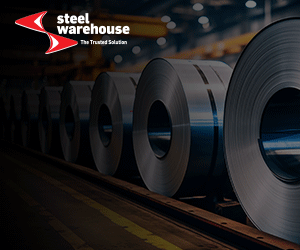SEE YOU AND RAISE YOU ONE
Buy American: It’s a common expression. But in terms of federal policy, not everyone buys that concept like it’s 10-cent apple pie – even in a steelmaking, manufacturing-oriented town such as Cleveland.
Posted: March 6, 2009
The $787 billion economic stimulus bill signed into law by President Barack Obama last week is meant to put Americans back to work. Toward that end, it contains a clause specifying that available American-made goods be used in construction and infrastructure projects financed by the measure.
To avoid provoking damaging trade wars with other nations, the bill specifies that existing trade agreements between the United States and other entities — including Canada, Japan and the European Union — be honored first. It also allows the use of foreign goods if using American products in their place would increase the cost of a project by 25 percent or more. But locally and across the globe, there are opposing opinions on whether the provision ultimately will save jobs or hurt both the U.S. and world economies.
Nations such as Brazil and China already are calling "foul," and many economists warn that anything that smells like protectionism is likely to spur retaliation from U.S. trading partners. "I understand the sensitivities," says economist Ken Mayland, president of ClearView Economics in Pepper Pike. "We don't want a stimulus plan for China. But to believe that you can impose some sort of Buy American plan into legislation and not expect other countries to respond in kind — or say 'I'll see you and raise you one' — is terribly naïve. It certainly threatens a trade war."
READ THE FINE PRINT
The economic stimulus bill specifies that existing trade agreements between the U.S., Canada, Japan, the European Union, and other countries be honored first, which allows the use of foreign goods if using American products in their place increases the cost of a project by 25 percent or more.
On the front lines of the economy, however, many manufacturers, their representatives and labor unions support the concept of buying American-made goods with taxpayer dollars and welcome the provision. Among the large manufacturers favoring the measure is ArcelorMittal, the world's largest steelmaker and the only one that still produces steel in Cleveland. The company declined interviews, but wasn't shy about pointing out that it supported the Buy American provision before the legislation was passed.
Mark Granakis, president of United Steelworkers Local 979 in Cleveland, which represents production workers at ArcelorMittal's Cleveland Works, is arm-in-arm with the company that employs his members on the Buy American issue. "Without question, there definitely (will be) more work for Cleveland because that provision is in there, but I don't know yet to what degree that will be," says Mr. Granakis.
Other local companies also stand to benefit from domestic spending prodded by the stimulus bill, though in some cases it's questionable whether their windfalls will depend on a Buy American provision. "There are certainly some aspects of the stimulus package that we're looking at very specifically as opportunities," said P. Kelly Tompkins, chief financial officer of Medina-based RPM Inc.
RPM and its subsidiaries make coatings, sealants, roofing materials and other goods that likely would be used in infrastructure projects, such as building or repairing bridges and constructing schools, explains Mr. Tompkins. However, those kinds of materials are not usually competing vigorously with overseas producers anyway, because they are heavy, relatively low-cost supplies that are costly to ship great distances.
SMELLS LIKE STEEL TARIFFS
Some U.S. manufacturers are wary that this smells like protectionism. They remember the steel tariffs used to protect U.S. steel and how the end result of those was higher steel prices that hurt domestic metal fabrication shops that relied on steel.
Even some manufacturing representatives are wary of anything that smells like protectionism. "Part of it goes back to when our industry got burned so badly by steel tariffs," notes Bill Gaskin, president of the Independence-based Precision Metalforming Association, a trade group for metalworking companies. Gaskin says when the United States tried to protect its steel industry in previous decades — with mixed results — the end result was higher steel prices that hurt U.S. metal fabrication shops that relied on steel as their chief raw material.
Still, PMA supports the Buy American measure, with the language requiring compliance with existing trade agreements, which Gaskin said assuaged at least one member in Canada. "Right in the middle of the Buy American negotiations, I got a call from one of our Canadian members saying, 'Gosh, what's America trying to do?!'" he recalls. "But their concerns were ameliorated as soon as they saw the new language."
This article was excerpted from a feature that recently appeared in Crains Cleveland Business, published by Crain Communications Inc., 700 West St. Clair Avenue, Suite 310, Cleveland, OH 44113-1230, 216/522.1383, www.crainscleveland.com.
ClearView Economics, LLC, 3237 Fox Hollow Drive, Pepper Pike, OH 44124, 216-595-9931, www.clearvieweconomics.com.
ArcelorMittal, Luxembourg, 19 avenue de la Liberté, L-2930 Luxembourg, +352 4792-1, Fax: +352 4792 2675, www.arcelormittal.com.
Precision Metalforming Association, 6363 Oak Tree Boulevard, Independence, OH 44131-2500, 216-901-8800, Fax: 216-901-9190, www.metalforming.com.














